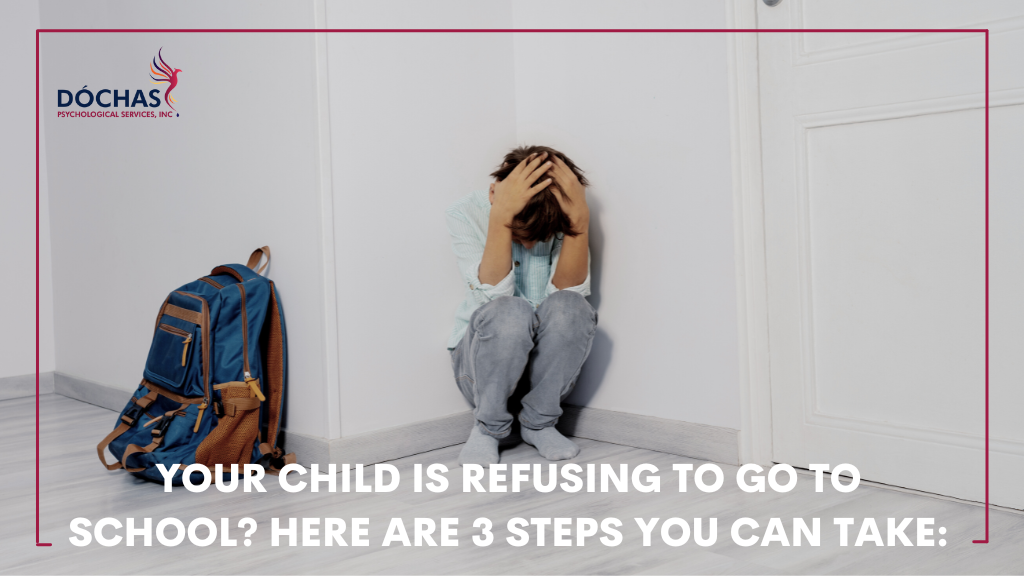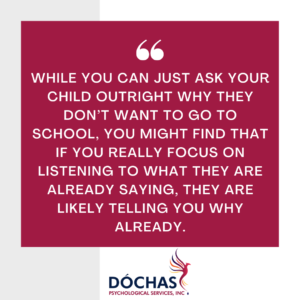It’s Barbara here on the Dóchas blog, and today I have some tips for when your child is refusing to go to school.
As we roll into October, the excitement of going back to school and seeing friends and teachers after a long summer has likely worn off. You may find it more of a struggle in the morning to convince your children to get up, get ready for, and go to school. For some, you may even be dealing with flat out refusal to go to school and every morning then turns into a fight with tears and screaming, leaving no one feeling good. So, what do you do when your child is resisting or flat out refusing to go to school?
Step 1: Narrow down some reasons
An important step is to figure out why they don’t want to go to school. Some reasons could include:
- Troubles with friends
- They are being bullied
- They have no friends
- They are struggling with a certain subject
- They don’t like their teacher
- They feel anxious
- They miss you during the day
- They find school boring
Of course, this list isn’t the be-all and end-all list of reasons your child might not want to go to school. Every child is unique and has reasons specific to them. This means the only way to truly know why your child doesn’t want to go to school is by asking them, and then actually listening to their answer.
Step 2: Focus on listening to what they are telling you
While you can just ask your child outright why they don’t want to go to school, you might find that if you really focus on listening to what they are already saying, they are likely telling you why already. Adele Faber and Elaine Mazlish, authors of How to Talk so Kids Will Listen & Listen so Kids Will Talk suggested four steps to fully listening to your child so that they become more willing to talk to you:
- Listen with full attention. Put away the phone, turn off the TV, and get down to your child’s level and show them that they are the focus of your attention.
- Use encouraging words that show you are listening (e.g., “oh”… “mmhmm”… “I see”…). This can encourage your child to continue talking and shows that you are listening.
- Help your child identify their feelings. For example, if your child is telling you how upset they are about a low grade on a spelling test after they practiced all week, you can acknowledge that they may be feeling disappointed. If they say that is the wrong feeling, don’t try and insist that it is correct, instead ask them to correct you and/or suggest another feeling until it feels right to them.
- Acknowledge their desires without trying to just logic the problem away. For a child upset about having to do math at school, instead of trying to logically explain that math is important to learn, you could respond with phrases like, “I wish math wasn’t so important”, “I hear how much you don’t like math”, “I wish I had the power to erase math from the world”. This lets your child know that you understand how they are feeling and knowing that you understand can make it a little easier for them.
Step 3: Start working on a solution
Once you have a better understanding of why your child doesn’t want to go to school, then you can work with your child to come up with a solution. If they are being bullied, you might suggest that you talk to the principal and teacher with your child to get support at school. If they have no friends to play with at recess, maybe you invite someone from school for a playdate to help build a friendship. If they are struggling with a certain subject, then maybe you promise to help them work on it at home. The important thing is to listen to your child and then work with them instead of just forcing your solution on them.
It can feel scary and overwhelming when your child is facing something and there’s nothing you’d like to do more than to help them in some way. If you need additional support in helping your child who doesn’t want to go to school, there are many therapists at Dóchas that would love to help you out. Reach out to us at 780 446 0300 or by email at info@dochaspsych.com.
About Dóchas Psychological
Dóchas Psychological Services is a well-established and trusted therapy clinic located in Spruce Grove, Alberta. At Dóchas we value the idea that everyone deserves a safe space. Through connection and education, our team works hard to build a trustworthy relationship with each of our clients. It is our goal to create a community for our clients to feel like they belong.
Disclaimer
Information provided through Dóchas Psychological Services blogs or vlogs is meant for educational purposes only. They are NOT medical or mental health advice. You can read more about our disclaimer here.











